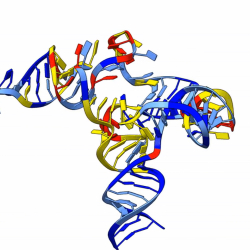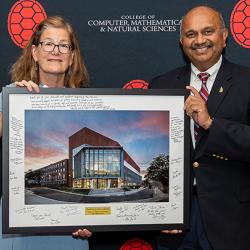Making a Difference, One Face Shield Part at a Time
UMD chemist helps manufacture COVID-19 protection for medical workers in his home
A few weeks ago, Paul Paukstelis was printing 3D models of molecules in a lab in the University of Maryland’s chemistry building. But then COVID-19 struck and the UMD associate professor of chemistry and biochemistry added a new mission.
Working in the basement of his home, he’s printing plastic pieces that will be used to make hundreds of protective face shields, lifesaving protection for medical professionals on the front lines of the COVID-19 pandemic. Around the world, the need for these face shields to protect doctors and nurses treating patients with the coronavirus is more urgent every day, but protective equipment is in short supply.
By early April, Paukstelis said he had donated 500 pieces to organizations that sterilize the parts, assemble them into complete face shields and distribute them to area hospitals in need. As coordinator of his department’s 3D printing lab, Paukstelis is active in the local maker community, which has been rallying around efforts to help during this public health crisis.
“I heard about this effort to print parts for shields through the maker community on Twitter and Facebook,” Paukstelis said. “And I knew we had the equipment at the lab to help.”
The pieces he makes are the headbands that hold the plastic shield in place over the wearer’s face. To facilitate round-the-clock production, Paukstelis brought a few 3D printers home from the lab, with the blessing of the department. He set them up alongside two of his own personal printers in his basement and created a GoFundMe page to help purchase plastic thread the 3D printers use to make objects. The $1,500 he raised helped him purchase so much of that material that Paukstelis is giving away the excess to other makers in the area who are also part of the face shield effort.
Paukstelis said his basement has definitely been transformed by the project. With 10 printers operating around the clock, the space is warmer than ever and humming nonstop.
“It takes two and a half hours to print one piece,” Paukstelis said. “At night, I print stacks of four connected pieces that you just snap apart, so you don’t have to get up and tend the printers.”
Even as he’s printing and delivering his headbands for the face shield project, Paukstelis continues to teach, recording online lectures and hosting discussion sessions for his BCHM461: Biochemistry I class. Like just about everyone living under stay-at-home orders, Paukstelis found the adjustment challenging, but knowing he’s making a difference in the fight against COVID-19 helps him stay positive.
“Having something like this to focus on is fulfilling for sure,” he said. “Especially if these things I am making can help the medical community.”
###
Writer: Kimbra Cutlip
Media Relations Contact: Abby Robinson, 301-405-5845, abbyr@umd.edu
University of Maryland
College of Computer, Mathematical, and Natural Sciences
2300 Symons Hall
College Park, Md. 20742
www.cmns.umd.edu
@UMDscience
About the College of Computer, Mathematical, and Natural Sciences
The College of Computer, Mathematical, and Natural Sciences at the University of Maryland educates more than 9,000 future scientific leaders in its undergraduate and graduate programs each year. The college's 10 departments and more than a dozen interdisciplinary research centers foster scientific discovery with annual sponsored research funding exceeding $175 million.










